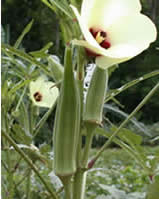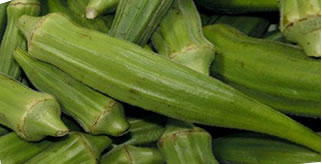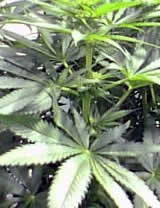 Scientific Name: Abelmoschus esculentus Moench, Hibiscus esculentis Linn
Scientific Name: Abelmoschus esculentus Moench, Hibiscus esculentis Linn
Common Names : Okra, Gumbo, Lady fingers (English), Huang su kui (Chinese), Gombo (Spanish), bhindi (Hindi/Urdu), krachiap mon (Thailand), bamya (Arab Ochro, Okoro, Quimgombo, Quingumbo,
Okra (Abelmoschus esculentus Moench, Hibiscus esculentis Linn), known in many English-speaking countries as lady's fingers or gumbo, is a flowering plant in the mallow family. Okra is an annual herb that is widely cultivated for its edible green seed pods in tropical, subtropical and warm temperate climates. Okra is a hardy plant that can grow even with less water and in hot conditions.
Okra is somewhat related to cotton and hollyhock. Okra plant can grow up to 9 feet in height with heart shaped leaves that is palmate with 5 to 7 lobes. Okra flowers are large with 5 petals colored white or yellow and sometimes with a reddish-purple base. Okra seed pods are 3 to 10 inches in length about ½ to 1 inch wide. Okra fruit or pod is usually green in color with a new red variety. It is tapering in shape with ribs along its length.
Okra fruit is valued as vegetable, harvested while young and has mucus-like juice that is used to thicken stews (gumbo). Okra is also known for its nutritional value and offers varieties of health benefits.

 Scientific Name: Abelmoschus esculentus Moench, Hibiscus esculentis Linn
Scientific Name: Abelmoschus esculentus Moench, Hibiscus esculentis Linn Okra is available in most grocery and vegetable stores. Buy okra fruits that are fresh, young, tender and firm. You will know it is fresh if it can easily be snapped in two. The best okra variety is the green color.
Okra is available in most grocery and vegetable stores. Buy okra fruits that are fresh, young, tender and firm. You will know it is fresh if it can easily be snapped in two. The best okra variety is the green color.

